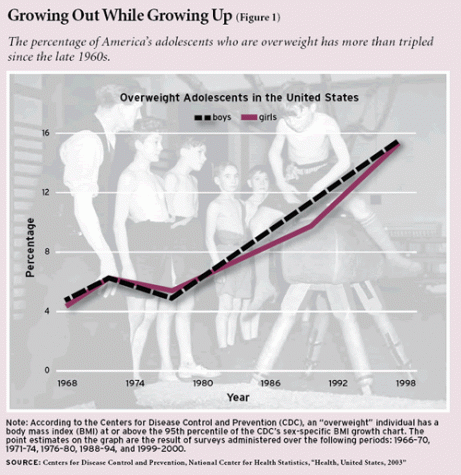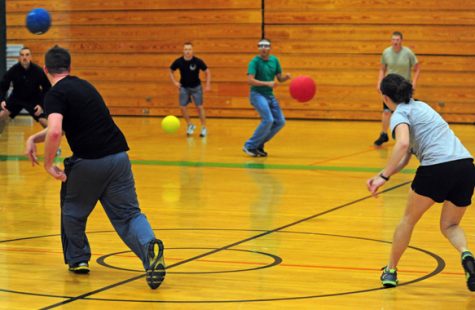Outdated gym requirements should be updated
Courtesy of Interactive Health Technologies
In Illinois, physical education is mandated five days a week for grades kindergarten through 12.
Physical education. When we hear those words, a certain image comes to mind: scrawny high school students adorned in ugly uniforms straight from the 1980s halfheartedly playing dodge ball, while an overweight gym teacher yells from the sidelines.
Although gym class isn’t exactly the same as depicted in the 1990s sitcoms, the overall concept of physical education in Illinois and at Central hasn’t changed much over the years. P.E. has been a state requirement in Illinois dating back to World War II, mandating five days a week of P.E. for grades kindergarten through 12.
“There is a very strong and respectful relationship between Illinois state legislators and our professional state association (Illinois Association for Health, Physical Education, Recreation, and Dance),” said Ms. Janelle Marconi, district department chair of physical education. “So many of our professionals in the health and teaching industry strongly advocate for daily physical education because they understand the research that clearly shows the benefits (physical, mental/emotional/social) of movement during the academic day for all students. This data and research is always shared with our state legislators and when they see the scientific benefits students can have from physical activity during the school day, lawmakers want to support that.”
Currently, 46 states mandate P.E., but Illinois is only one of six to require P.E. in every grade, and only one of five to have weekly time mandates regarding P.E. class. Personally, I deem it to be ridiculous to expect students to participate in P.E. every day of the school week for 13 years, and I believe that Illinois needs to adjust its outdated laws on the matter.
Just a little over half, (26 states) require only one year of P.E. for high schoolers, and I believe that Illinois should follow their lead. Although exercise is important, gym class has little to no impact on students’ physical health, it is counter-productive towards promoting good mental health, and doesn’t take into account exercise outside of school.
“I think gym should be optional as long as students have some form of physical activity outside of school,” said Ansh Shah, junior varsity tennis player. “I think health is important, so gym is still important, but if there is physical exertion outside of school, study hall should be offered as an option.”
P.E., although it was designed with good intentions to promote student health and limit obesity, is largely ineffective in enhancing the physical well-being of students. A 2012 study based on data from the National Survey of Children’s Health found that required P.E. alone generally doesn’t have any noteworthy impact on boys’ physical-activity levels or obesity, though it did have a marginal impact on girls’. Similarly, a 2015 study on Texas’s Fitness Now program found it to be largely ineffective, only resulting in minimal improvements to fitness skills and having no impact on BMI (body mass index).
Even if gym classes are designed to be rigorous, there is no way to force every single student to participate to the best of their ability. The reality is, only the students who want to be there will try their hardest. Speaking from experience, I have witnessed kids literally sit on the floor for the entirety of the period. Under no circumstances are those kids going to participate.
“Physical education has a history of being ‘just gym class.’ Students who make the decision to not get out of their comfort zone and de-stress or engage in the activities that can benefit them physically and academically are just missing out,” Marconi said. “Teachers can motivate [students] to a point but it is really up to the individual student to make the choice to participate and engage in an activity.”

Despite physical education mandates, childhood obesity rates have been consistently increasing in the United States.
Gym class has also been proven to be counter-productive in promoting mental health. From 2007 to 2011, Texas schools ran a program called Texas Now, in which middle schoolers were required to participate in gym every day. The program was designed to increase both fitness and academic achievement, but the results were counter-intuitive: the schools saw an uptick in absence rates. Students were skipping school in order to avoid gym class. Analisa Packham, professor at Miami University of Ohio who co-authored the study on Texas Now, said that the increased absence rates could be attributed to bullying. It isn’t uncommon for kids, middle schoolers especially, to be made fun of for their lack of athletic capability, size, or both. I think it’s fair to say that we’ve all been self-conscious before, and gym class is an environment that can stimulate these feelings.
Central claims that gym class and the SELAS curriculum integrated on flex learning days will promote mental health, but I have not found this to be true. Central is a tough, competitive school, and it’s not much of an exaggeration to say that I would do anything for a study hall.
During my gym period, I often think about how much I could accomplish in terms of homework and how much time I could shave off of my work at home. I have been assigned upwards of six hours of homework a day during my tenure as a Central student, and I find it ridiculous that the school expects me to squeeze gym into my schedule when my time could be better spent doing that work. Taking a study hall instead of gym would do much more for my mental health, as it would offer me the opportunity to decrease my immense workload after school.
The SELAS curriculum integrated into gym classes through flex learning days and freshmen P.E. were designed to help students manage stress, but instead, they do quite the opposite. On flex days, I have received a significant amount of SELAS homework, which simply contributes to my stress instead of relieving it.
Speaking from experience, the most counter-intuitive aspect of P.E. at Central is the attendance policy for group exercise and early bird classes. We lose points for being absent, regardless of whether or not we are sick. This policy does not apply to other gym classes, and group exercise and early-bird students are the only ones who are punished for being ill. It is stressful to have a low grade in any class, but especially one you received solely because you were sick. I have a B on my transcript because I was incredibly ill and missed a significant amount of school, which added to my anxiety regarding my absences considerably. I find this policy to be both stress-inducing and unfair.
P.E. at Central shows no regard for exercise outside of the school. All students are required to take four years of P.E., and can only be exempted during their season of a school sport during their junior and senior year.

Studies have cited gym as a source of low self-esteem, as students are often bullied for their size or lack of athletic capability.
Most students exercise beyond school, and those that don’t aren’t the ones to put in the effort during P.E. I appreciate that District 86 allows student-athletes to be exempt in season, but this policy should be extended to underclassmen as well. They are working just as hard as the upperclassmen and deserve the same benefits.
Similarly, the district needs to acknowledge students who are active outside of school. This year, District 86 eliminated a mandate allowing elite student-athletes to become exempt from P.E., forcing students that compete nationally and practice almost every day of the week to take part in gym class.
There are students at Central who practice sports like gymnastics and tennis every day for hours on end but receive no recognition for that from the school. Even students who aren’t ranked for their respective sport often play in club teams, some of which practice six days a week.
“It might be beneficial to have an option for a study hall for students who spend lots of time outside of school training for their various sports,” said Emily Ascher, junior varsity golfer. “Personally, I practice [golf] every day after school, which results in a lot of stress and lack of sleep while trying to balance school and golf. I think it would alleviate a lot of my stress if I were able to have a study hall instead of a mandatory workout, as I end up exercising every day for golf anyway.”
Marconi explained that student-athlete exemptions operate on a case by case basis.
“Our physical education program in District 86 is supportive of student-athletes and their goals to be a top-quality athlete,” Marconi said. “The courses we provide our students are supportive of development in strength, speed, and agility. These courses support all athletic programs as well.”
I am no Division 1 recruit, but I do exercise on my own. I work out four to five times a week, and I gain a lot more from that than I do from gym every day. I believe that exercise should be an individual choice, not one that is made for you by the state.
It can be argued that P.E. offers a relaxing break in the day in which students can escape the stresses of adolescence.
“Gym is just a great break in the day that gets you moving and thinking better,” said Estera Crisan, sophomore. “Also, physical activity is one of the most important parts of development and a lot of people don’t exercise on their own or don’t know how to exercise properly.”
For some students, gym is something to be looked forward to. It is something they anticipate every day, and that’s great. This isn’t the truth for everyone, but for those who do enjoy gym, it should be offered full time. I would rather exercise outside of school, but if another student wants the option to work out during school hours they should have that option readily available.
There is no doubt that physical health is important. However, physical education has had counter-productive results in promoting it. It is at best ineffective, and at worst detrimental to mental health. It is unreasonable to expect five days of an unproductive class for 13 years, thus Illinois needs to rectify its outdated laws regarding the topic.

Sophie, a senior, is a second year member of the Devil's Advocate team. At Central, she is a mentor for Business Professionals of America,...














